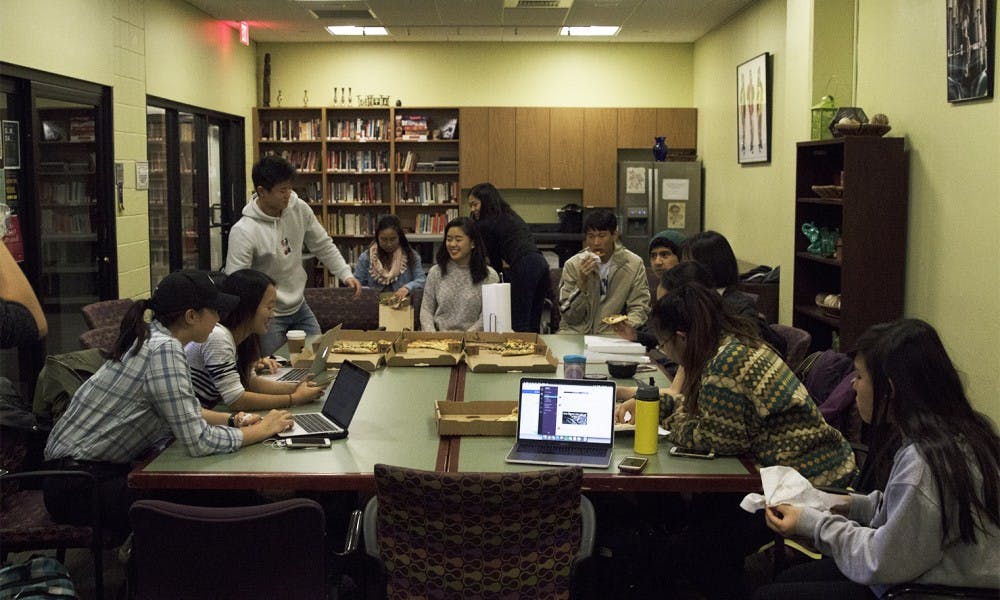Duke students and faculty are continuing to push for the creation of a program in Asian American Studies despite years of resistance from University programs.
The Asian American Studies Working Group—formed in October 2016 and consisting of students, faculty and staff—convened Monday to review the history of Asian American Studies at Duke. For several years, students have advocated for the establishment of an Asian American Studies major—a campaign that began in 2002 and was renewed after the controversial Asian-themed party hosted by the Kappa Sigma fraternity in 2013.
On Wednesday, Duke Student Government also passed a resolution in support of the creation of an Asian American Studies program. According to the resolution, the program should "include a fully operational department, tenure-track faculty and academic major" and should be part of “an effort to bring a broader range of perspectives to the university.”
“I think it’s fair to say that all people deserve to understand themselves and those around them,” wrote Christine Lee, president of the Duke Asian Students Association, in an email. “This is not just a problem of Asian American students not being generally supported by the institution...this is a gap in Duke’s academic research and an area in which Duke is being left behind.”
Sophomore Annie Yang added that Asian American Studies "has potentially a lot to offer," and that a program would show that Duke cares about its Asian population.
Approximately 25 percent of undergraduate students in the Class of 2021 identify as Asian, Asian American or Pacific Islander, according to a report from the Office of Undergraduate Admissions.
Leo Ching, associate professor of Asian and Middle Eastern Studies who has supported student demands for an Asian American Studies program since 2002, noted that an understanding of America is incomplete without specific attention to the study of Asian American experiences.
“A major university like Duke has the intellectual responsibility to educate all students, not just Asian Americans, on the histories and cultures of this diverse group and their contributions to the United States,” Ching wrote in an email.
He said he foresees an Asian American Studies as an interdisciplinary and inter-ethnic program that examines the lived experiences of peoples of Asian descent in America.
Senior Aamir Azhar, who helped lead Monday's work study group meeting, added that such a major could include an introductory survey course and other courses covering topics such as Asian American history, literature, gender and sexuality and spaces.
Several peer institutions—including Northwestern University, Cornell University, Stanford University, the University of Pennsylvania and the University of California at Berkeley—offer majors in Asian American Studies. According to a directory of Asian American Studies programs compiled by Cornell University, more than 30 U.S. colleges and universities have Asian American Studies programs.
Administrators at Duke have not been as receptive to the idea. Arlie Petters, dean of academic affairs for Trinity College of Arts and Sciences, did not respond to multiple requests for comment. But Lee Baker, who formerly held the same position, told The Chronicle in 2016 that the hesitation has historically been because of low student interest.
Baker said then that neither the East Asian nor the South Asian Studies certificates had been particularly popular. He also noted that there had not been many Asian American studies proposals within Program II, a program that lets students design their own majors.
But Lee said that many recent course offerings related to Asian American Studies have had waitlists. She said a Spring 2017 course taught by Eileen Chow, visiting associate professor of Asian and Middle Eastern Studies, had to double its enrollment cap due to high demand.
Lee also said she disagreed with the argument concerning Program II proposals.
“I myself attempted to form an Asian American Studies-related Program II my freshman year, but was dissuaded by several well-meaning professors,” she wrote. “There are just not enough courses for a Program II application to be approved.”
Lee, Yang and Ching all said the biggest obstacle slowing the effort is a lack of faculty capable of specializing in the field.
“Few of us are trained in Asian American studies, which is a legitimate and respected field," Ching said. "Tenure-track faculty lines are expensive and coordinating with academic units to prioritize their hiring for Asian American Studies faculty will take time and incentive from the administration.”
He also noted he would like to see several different academic departments hire Asian American scholars and try to reshape their existing curriculums to incorporate contents and methodologies from Asian American Studies.
Yang added that it could take another few years to get past the “bureaucratic red tape” and gather greater “institutional support” from the University.
Get The Chronicle straight to your inbox
Sign up for our weekly newsletter. Cancel at any time.
Still, several students have already met with some University administrators—such as Valerie Ashby, dean of Trinity College of Arts and Sciences—to discuss the possibility of adding an Asian American Studies program, Lee said.
Azhar said the administration has agreed to bring in a postdoc specializing in Asian American Studies.
More recently, a photo campaign started by the Asian American Studies Working Group and called “Duke Doesn’t Teach Me” featured dozens of participants. A petition for support in Nov. 2016 also gathered more than 500 signatures in less than two days.
But the DSG resolution may be the strongest evidence yet that the fight for an Asian American Studies program is gaining momentum.
"It's moving slow, as all academic programs would, but progress is being made and talks with administration are being developed," Azhar wrote in an email.

